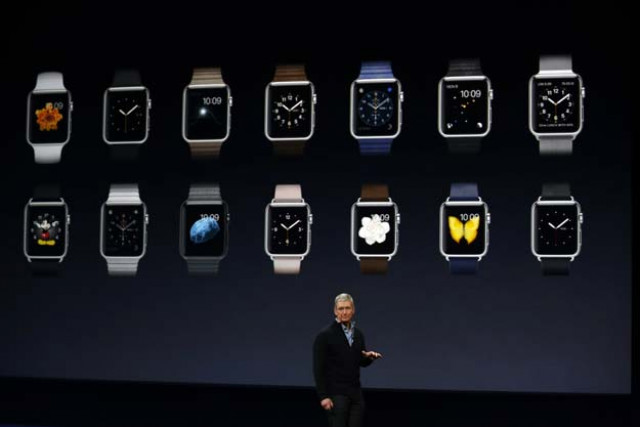Apple Watch may move the needle on wearable tech
The company announced its plans for Apple Watch last year

Apple CEO Tim Cook debuts the Apple Watch collection during an Apple special event at the Yerba Buena Center for the Arts on March 9, 2015 in San Francisco, California. Apple Inc. is expected to unveil more details on the much anticipated Apple Watch, the tech giant's entry into the rapidly growing wearable technology segment. PHOTO: AFP
Apple Watch is expected to be the star at a media event being held at the same San Francisco theatre where the California tech giant introduced the iPad.
Apple's chief executive Tim Cook has revealed little about the sophisticated wrist wear, but has said that he "can't live without it."
The company announced its plans for Apple Watch last year to much fanfare and has said it would begin shipping in April. It will mark Apple's first new product type since the iPad in 2010.
Apple enter a market that already has a number of players, ranging from South Korean giants Samsung and LG, to Japan's Sony and startups such as Pebble.
Motorola, acquired by Chinese giant Lenovo last year, also produces a smartwatch, and China's Huawei introduced its version at the Mobile World Congress in Barcelona this month.
But analysts expect Apple to lift the market by integrating the watch with the iPhone and its software ecosystem, and its range of apps and sensors for health and fitness.
"How Apple creates a cohesive value proposition integrating hardware with software and services is as always the key," said Nick Spencer at ABI Research.
"The three main areas of wellness data and services, Apple Pay, along with creating an intelligent and differentiated relationship between the watch and the smartphone must be the foundations of the Apple Watch proposition."
Apple has indicated that the entry price would be $349 in the United States, and that two different sizes would be available in three collections, including the "Apple Watch Edition," featuring 18-karat gold cases in yellow or rose, sapphire crystal and finely crafted bands and closures.
The watch is also expected to include map software that guides people to destinations with gentle "taps" on the wrist.
Fitness apps on the Apple Watch and its rivals could spell trouble for makers of fitness bands from companies like Jawbone, Fitbit and Nike.
Jan Dawson at Jackdaw Research said Apple must find the right balance for the new device -- giving people alerts and notifications when they need them without overwhelming them.
"One of the criticisms of some of the other watches out there is that notifications are something of an all-or-nothing phenomenon: either you get utterly bombarded with notifications or you get none, but its been tough to get granular control," Dawson says in a blog post.
"So it becomes all the more important that Apple get this right on the Watch. The ability to manage notifications and other activity on the Watch so that you only get notified for the things you really care about is a key value proposition."
Apple reportedly had to scale back health tracking features on the watch after some sensors didn't rise to the challenge.
Research firm Strategy Analytics predicts Apple will set fire to the market from the outset, projecting sales of 15.4 million units worldwide in 2015, to give Apple a 55 percent market share.
More conservative, ABI Research expects Apple to ship 13.77 million units, just under 50 percent of the market.
But Spencer said Apple needs to meet consumer needs for battery life, and offer the right mix of services and apps.
Roger Kay, analyst at Endpoint Technologies Associates, said Apple's loyal consumer base will deliver a certain number of sales but won't guarantee widespread adoption.
Kay said Apple needs to find a way to integrate the watch into a new kind of intuitive computing which is only now emerging.
"No one knows yet whether the wearables category is going to make it," Kay said.
"One thing that could help, though, is a rich set of tactile effects that only wearables -- which, by definition, lie close to the body -- can deliver."



















COMMENTS
Comments are moderated and generally will be posted if they are on-topic and not abusive.
For more information, please see our Comments FAQ